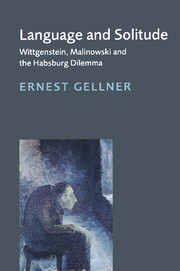Book contents
- Frontmatter
- Contents
- Preface
- Foreword
- Part I The Habsburg dilemma
- Part II Wittgenstein
- 10 The loneliness of the long-distance empiricist
- 11 The poem to solitude, or: confessions of a transcendental ego who is also a Viennese Jew
- 12 Ego and language
- 13 The world as solitary vice
- 14 The mystical
- 15 The central proposition of the Tractatus: world without culture
- 16 Wittgenstein mark 2
- 17 Tertium non datur
- 18 Joint escape
- 19 Janik and Toulmin: a critique
- 20 The case of the disappearing self
- 21 Pariah communalism
- 22 Iron cage Kafka-style
- Part III Malinowski
- Part IV Influences
- Part V Conclusions
- General bibliography
- Bibliographies of Ernest Gellner's writings on Wittgenstein, Malinowski, and nationalism
- Index
17 - Tertium non datur
Published online by Cambridge University Press: 05 March 2010
- Frontmatter
- Contents
- Preface
- Foreword
- Part I The Habsburg dilemma
- Part II Wittgenstein
- 10 The loneliness of the long-distance empiricist
- 11 The poem to solitude, or: confessions of a transcendental ego who is also a Viennese Jew
- 12 Ego and language
- 13 The world as solitary vice
- 14 The mystical
- 15 The central proposition of the Tractatus: world without culture
- 16 Wittgenstein mark 2
- 17 Tertium non datur
- 18 Joint escape
- 19 Janik and Toulmin: a critique
- 20 The case of the disappearing self
- 21 Pariah communalism
- 22 Iron cage Kafka-style
- Part III Malinowski
- Part IV Influences
- Part V Conclusions
- General bibliography
- Bibliographies of Ernest Gellner's writings on Wittgenstein, Malinowski, and nationalism
- Index
Summary
The ‘two options only’ assumption was the really important, intriguing, fascinating and tacit premise: either universalism or epistemological populism. That Wittgenstein held it to be true, unquestionably so, seems clear. It alone makes sense of his development, but there is also direct evidence of conscious endorsement of it. Consider the following passage: ‘he told me once that he really thought that in the Tractatus he had provided a perfected account of a view that is the only alternative to the viewpoint of his later work’ (Malcolm 1958: 69; emphasis in the original). Assumptions built deeply into a cultural atmosphere and, more than that, assumptions which are corollaries of the objective social situation in which that culture is operating, can and do appear to men living within that world as overwhelming, indubitable truisms.
The ‘two and only two’ idea – the reduction of available alternatives to the choice between an individualistic, universalistic, liberal centre and a rival particularistic, communalistic, culture-revering vision – was deeply built into the whole life of the terminal period of the Habsburg Empire. There is no evidence that Wittgenstein was ever consciously interested in social and political questions, that he was preoccupied with issues such as whether a Danubian federation should be preserved, or whether, on the contrary, the rival ethnic cultures of the region should secure their wholly sovereign states, each dedicated to the protection and maintenance of its own national culture. The speculation of the Austrian Marxists about cultural pluralism and political unity appear to have left no mark at all on his mind.
- Type
- Chapter
- Information
- Language and SolitudeWittgenstein, Malinowski and the Habsburg Dilemma, pp. 74 - 78Publisher: Cambridge University PressPrint publication year: 1998



